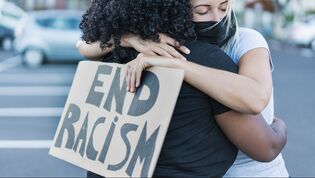 By Allie Lehr, MA, PLMFT Just a few years ago, I was someone who would fight to the death that “I am not a racist.” Maybe you too have thought to yourself something along the lines of, “I don’t say racist words and I treat everyone the same, so I am not a racist ” or “wow this is a problem, but I can’t do anything about it.” Maybe someone has brought something up to you, and you got defensive and started “othering” (like this is a problem for someone else). If you feel called out right now, you, like most of us, might have some uncomfortable and necessary work to do. To be honest, it wasn’t until halfway through graduate school that I got called out by a mentor I look up to and became aware of the throne of white privilege, I was sitting on. All of a sudden, it became clear that in order to be the clinician, and human, I wanted to be, I needed to acknowledge my privilege, confront my biases, and decide how I wanted to participate in systems built on oppression and racism. Our work is far from over. In the mental health field, racial disparities within the system are well documented, especially around misdiagnosis. Black men are four times more likely than white men to be diagnosed with schizophrenia, but far less likely to be diagnosed with post-traumatic stress disorder and mood disorders. BIPOC are also over-represented in the criminal justice system and statistics show over 50% of those incarcerated have mental health concerns. This indicates that instead of receiving treatment for their mental health concerns, BIPOC often end up incarcerated as a result of their symptoms. We also know that mental health care provided in prisons is often offered at a lower standard of care and fails to acknowledge the traumatic conditions and practices in prisons. Research also suggests that compared to people who are white, black indigenous and people of color (BIPOC) are: less likely to have access to quality mental health services, less likely to seek out services (up to 30%), less likely to receive needed care, more likely to receive poor quality of care, more likely to end services prematurely. In other words, BIPOC are not getting the mental health care they need and deserve. Anti-racism work is uncomfortable, active and ongoing. It does not end because it isn’t being covered by the media, or you finished reading a book or listening to a podcast. If you have let your work fall to the wayside, I want to encourage you to pick it back up. If you are just now starting, welcome! Here are some of my favorite resources to get started on. Books: How to be an Anti-racist by Ibram X. Kendi I’m Still Here: Black Dignity in a World Made for Whiteness by Austin Channing Brown The New Jim Crow by Michelle Alexander They Can’t Kill Us All: The Story of Black Lives Matter by Wesley Lowery Just Mercy: by Bryan Stevenson Me and White Supremacy by Layla Saad So you Want to Talk about Race by Ijeoma Oluo Films/TV Series
Websites and Articles
Anti-Racism Courses
1 Comment
|
JENNIFER EULBERG, MA, LPCWelcome Jennifer, our new blogger!
Jennifer is a counselor at Sandhill who specializes in depression, self-esteem, and grief & loss. Get to know Jennifer as she shares her perspectives on life, contemplates value themes, and offers gentle encouragement. THANK YOU to Stefanie Pisarkiewicz, LPC for her blog contributions from November 2014 - February 2019! Archives
May 2024
Categories |
|
CALL TO SCHEDULE AN APPOINTMENT
636-379-1779 |
|
Locations:
801 S. Woodlawn Avenue, Suite 15, O'Fallon, MO 63366 13303 Tesson Ferry Road, Suite 50, St. Louis, MO 63128 Email: [email protected] Phone: 636-379-1779 • Fax: 636-634-3496 |
